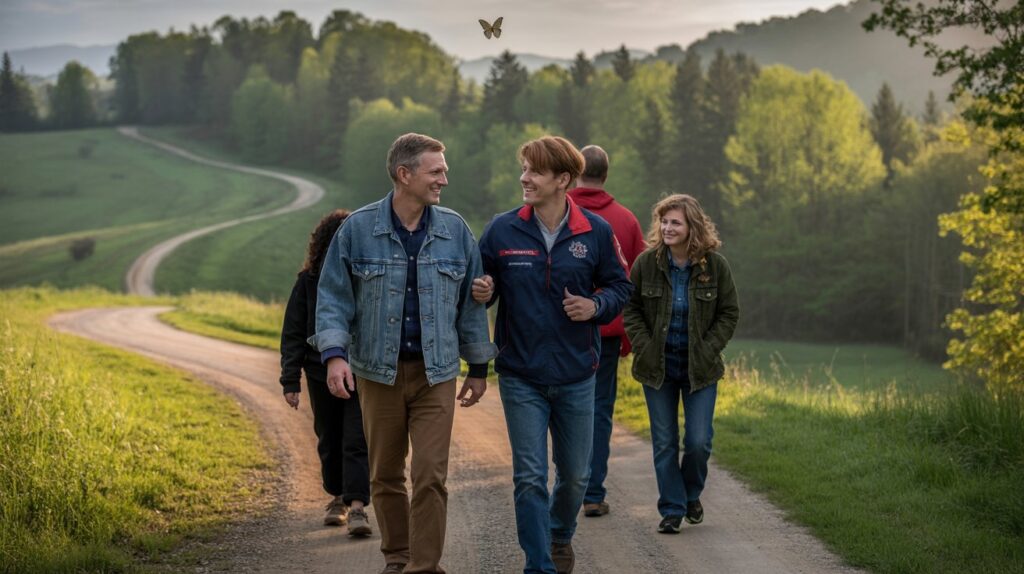In the quiet hills of Kentucky, surrounded by the Daniel Boone National Forest, the journey to overcome addiction begins with hope. Recovery from substance use, whether alcohol, drugs, or prescription medications, is filled with ups and downs. For adults in Kentucky, including veterans and first responders, these struggles can feel especially personal, shaped by close communities and life experiences. At the Addiction Recovery Institute of America (ARIA) in Kentucky, we understand these challenges and offer support designed for you. This article looks at 10 common difficulties in addiction recovery, using real-life knowledge and proven methods to help you or a loved one find your way forward. From dealing with cravings to repairing relationships, here’s what to expect and how to keep going.
1. Why Are Cravings So Difficult in Recovery?
Cravings are strong urges to use substances, often toughest in early recovery. Your brain, used to alcohol or drugs, sends signals for more, especially during stress. In Kentucky, where opioid overdoses claimed over 1,000 lives in 2023 (CDC), cravings can feel overwhelming, particularly in rural areas with limited resources.
Managing cravings starts with knowing your triggers, like certain places or stressful moments, and learning new ways to cope. Therapy such as cognitive-behavioral therapy (CBT) helps you change your thoughts, using tools like mindfulness or journaling. Support groups in Kentucky give you a place to share what you’re going through, while medically supervised detox uses medication to make withdrawal safer and easier. Getting outside, like hiking in Daniel Boone National Forest, can also help distract you from urges and calm your mind. With time and practice, cravings lose their grip. People searching for substance abuse treatment in Kentucky often find that connecting with local groups and staying engaged in therapy can make a real difference during this stage.
2. How Can You Reduce the Risk of Relapse?
Relapse, going back to substance use, is common. Studies show 40–60% of people relapse in the first year. In Kentucky, rural living and social spots like local bars can make it even tougher. Relapse doesn’t mean you’ve failed; it’s often part of the journey.
To lower your chances, make a plan to spot your triggers, such as stress or certain friends, and build skills to cope. Group counseling helps keep you accountable, and one-on-one therapy deals with personal struggles. Programs like intensive outpatient care (IOP) give you continued support after residential treatment. In Kentucky, the peaceful setting helps you stay focused. Joining local recovery meetings, such as those at community centers, helps you meet others on the same path. Setting goals and learning ways to manage stress, like deep breathing, can help you stay steady. Local families searching for rehab facilities in Kentucky often choose programs that offer both group and individual therapy to support every stage of recovery.
3. Why Does the Stigma of Addiction Feel So Heavy?
The stigma of addiction, feeling judged by others, can be a heavy burden, especially in Kentucky’s close-knit towns. You might feel shame or worry about being rejected, which can stop you from reaching out for help. This can lead to isolation, making recovery harder.
Letting go of stigma starts by seeing your recovery as a sign of courage. Counseling can help you work through shame and rebuild your confidence. Support groups let you connect with people who understand what you’re facing, so you don’t feel so alone. In Kentucky, local organizations, like church-based groups, offer acceptance and a sense of belonging. Education helps, too sharing your story, even a little, can change how others see addiction. By focusing on your progress and spending time with supportive people, you can move forward and feel proud of your efforts. Many drug treatment centers in Kentucky now offer family and community support programs that can help break down this stigma and connect you with understanding people.
4. How Do Mental Health Issues Complicate Recovery?
Many people in recovery also struggle with mental health problems like anxiety, depression, or PTSD (these are called co-occurring disorders). In Kentucky, many veterans and first responders face PTSD, making recovery more complicated.
Dealing with mental health and addiction together is important. Therapies like trauma-focused CBT help you manage both, teaching you new ways to handle tough emotions without turning to substances. For veterans, special programs that address trauma from combat or service can help. Kentucky’s quiet, rural setting can also ease stress and help with emotional healing. Regular visits with a therapist make sure you keep moving in the right direction. By working on both mental health and addiction, you can build a more stable, healthy life.

5. Can You Rebuild Relationships After Addiction?
Addiction can damage relationships with family and friends, leaving trust broken. In Kentucky’s small communities, these wounds can feel even deeper, since loved ones may have seen your struggles firsthand.
Healing relationships takes patience and effort. Family therapy teaches you how to communicate, say you’re sorry, and set healthy boundaries. Telehealth makes it easier for families to join sessions, even from far away. Group counseling lets you learn from others in similar situations. In Kentucky, events for sober people give you a safe space to reconnect. Healing takes time; some relationships may need months to recover. Being honest and consistent helps build trust again. Strong relationships become a key part of your sober life.
6. Why Does Boredom Pose a Risk in Recovery?
After rehab, boredom can sneak up on you. Without substances, free time might feel empty, especially in quiet states like Kentucky where life moves a bit slower.
To fight boredom, try new hobbies and routines. Learning job skills or getting job coaching helps you find purpose. Activities like art, music, or yoga spark creativity and lift your mood, while exercise, such as walking in the forests, keeps you active. Structured programs help you stay on schedule. Local centers in Kentucky offer sober activities, like book clubs or volunteering, to help you meet people. By filling your time with things you enjoy, you lower your risk of relapse and build a better, more enjoyable sober life. Many people find that rehab centers in Kentucky offer a variety of activities and resources to help you discover new interests and stay connected.
7. How Do You Find Purpose After Quitting Substances?
Addiction can make you lose your sense of purpose. When you stop using it, you might feel lost for a while.
Finding new meaning takes some trying. Explore activities, set goals, and see what makes you feel alive. Creative outlets like music or writing let you express yourself and find new interests. Career counseling, especially for veterans and first responders, helps you move into work that feels rewarding. Some programs focus on helping others in recovery, which can be deeply satisfying. In Kentucky, volunteering or joining recovery groups helps you find your place. Looking back on your small wins, like finishing a therapy session, can help build confidence and purpose.
8. Why Is Transitioning to Everyday Life So Hard?
Moving from the routine of rehab back into daily life can be scary. Returning to your old neighborhood or seeing old friends can stir up cravings or stress.
To make this change smoother, support is key. Sober living homes give you a safe, stable place to adjust. Partial hospitalization programs (PHP) and telehealth IOP give you extra help while allowing you to work or take care of family. Therapy teaches you practical things like budgeting or managing your time. Kentucky’s calm natural setting helps you reflect and find peace. Local support groups are there to help you face new challenges. With the right structure and people around you, you can build confidence and keep your recovery strong.
9. How Do Financial Struggles Affect Recovery?
Addiction can bring money problems, lost jobs, debt, or legal trouble. In Kentucky, where times can be tough, financial stress can make recovery feel even harder.
Getting back on track starts with a plan. Outpatient programs offer help with budgeting and job searching to rebuild stability. Telehealth cuts down on travel costs, making care more affordable. Flexible payment options ease the load. In Kentucky, local job fairs and community resources help you find work. Small steps, like making a weekly budget or joining free support groups, help you gain momentum. By working on money issues as part of recovery, you set yourself up for better success.
10. Why Is Social Support Vital for Sobriety?
Loneliness can be a real challenge. Cutting off friends who use substances can leave you feeling alone, and making new connections isn’t always easy, especially in rural Kentucky.
Support from others is a big help. Peer support groups give you a place to talk and make sober friends. Community programs teach skills for making connections and setting boundaries. Telehealth lets you join support sessions from anywhere, which is great for those living outside town. In Kentucky, recovery meetings at local centers help you feel welcome. Taking part in sober events, like charity walks, helps build strong, positive relationships. Having people to encourage you and keep you accountable makes a big difference in your recovery.
Conclusion
Recovery from addiction is a journey with many challenges, from cravings to loneliness. But with every step, you get stronger. In Kentucky, the Addiction Recovery Institute of America supports you with therapy made for you, programs for veterans, and telehealth. As one local veteran shared, “ARIA’s care helped me rediscover my purpose.” Surrounded by the Daniel Boone National Forest, our facility is a peaceful place to heal. If you’re ready to face these challenges, reach out to ARIA at (606) 462-3001 to talk about how we can help you on your path to a substance-free life.

